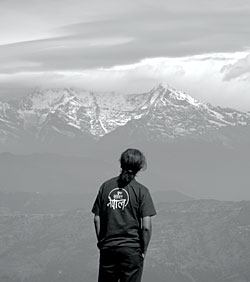 |
Here I am amidst the rolling hills of Okhaldhunga after walking along the scenic Sun Kosi. We left the political tumult of Kathmandu two weeks ago, and the capital seems far away: not just in terms of distance, but also in the everyday concerns of ordinary Nepalis.
Every village we pass through, every fellow traveller we meet on the trails, the concerns are about day to day needs: food, fodder, firewood. This is the essence of real Nepal, here in these hills that were made famous by the lyrics of Siddhicharan Shrestha, my revered guru.
Among my favourite songs is the famous poem written 50 years ago by Siddhicharan (Kyaru yo desh ko nimitta kyaru) that has been rendered to music by the very talented Nhyoo Bajracharya and sung with passion and verve by Yogeshwar Amatya. The simple music video by Bhusan Dahal makes it a creation that gives me goose pimples every time I watch it. Siddhicharan was inspired by these hills, forests and rivers of eastern Nepal by uncomplicated people with simple needs, but with a burning desire to contribute to society and make the country strong.
Every step I take on the ups and downs of the trails as we cross over from Okhaldhunga into Bhojpur, Siddhicharan's words resonate in my head, making me long for an idyllic, peaceful and socially just Nepal that he yearned for, a Nepal where everyone has an equal opportunity to excel, and be proud citizen of this country.
I am looking forward to meeting Shyam Tamot in Bhojpur, the writer and composer of the song Gaun Gaun Bata Utha. Nepal's communists adopted the song as their liberation anthem, but I sing it in my concerts because I think it is everyone's song.
Among my more recent songs is Mero Desh written by Bikram Subba, and it is the title song of Nepathya's eighth album. Mero Desh was later turned into a video also by Bhusan Dahal. The video featured artist David Douglas painting a flag of Nepal in his studio.
His name may sound European, but David is a Nepali through and through.
When we were shooting the video it was the day of Saraswati Puja, and David was reluctant to paint on a day that is dedicated to the Goddess of Knowledge, whom he respects.
In the studio, poet Bikram Subba's poetry came alive with the music and the artist's brush that accompanied it. It was also an amalgam of the melting pot that is Nepal: a Limbu, a Gurung and a Chhetri working with a Nepali with a western name.
In my two decades of being the leader of the folk rock band, Nepathya, I have composed and sung songs written by a Gaine, a Damai, a Lepcha, a Rai, a Brahmin, a Magar, a Chhetri, a Newar, a Tamang, a Gurung and many more. No one discriminated against me because of my ethnicity, and I didn't say I only wanted to sing songs from my particular ethnic group.
If Bikram Subba had written his poem in Limbu, I would not have been able to sing it. What brings us, binds us, and give us identity is the Nepali language. We can communicate across Nepal's incredible diversity because of this language. This is not to undermine the importance of our rich linguistic and cultural heritages, but to celebrate both our motherland's tongue as well as our mother tongues.
But suddenly 'unity' and 'nationalism' have become bad words. Who benefits from undermining Nepali nationalism and unity? Not us Nepalis. My songs have always looked for those links that bind us together as a nation, across ethnic and linguistic lines, whether we live in the Himal, Pahad or Tarai. I use subtle lyrics by poets from Nepal's diverse ethnicities, melding them with the melodies representing the nation's cultures and the heartbeat of our drums.
There are two types of nationalistic songs in Nepal. The first in which we celebrate a hollow, insecure nationalism that praises the bravery and sacrifices of our ancestors and extols the virtues of the land of the danphe and monal, Everest and Lumbini. Then there are the songs that evoke a deep emotional attachment to our roots, and the land of our birth.
I tend to sing the second type of songs. Ones in which up on stage I do not have to prove I am Nepali and I do not need to drape myself in the double triangle. I am singing for Nepal, and Nepal sings with me.
Watch:
Yogeshwar Amatya's Kyaru Yo Desh



